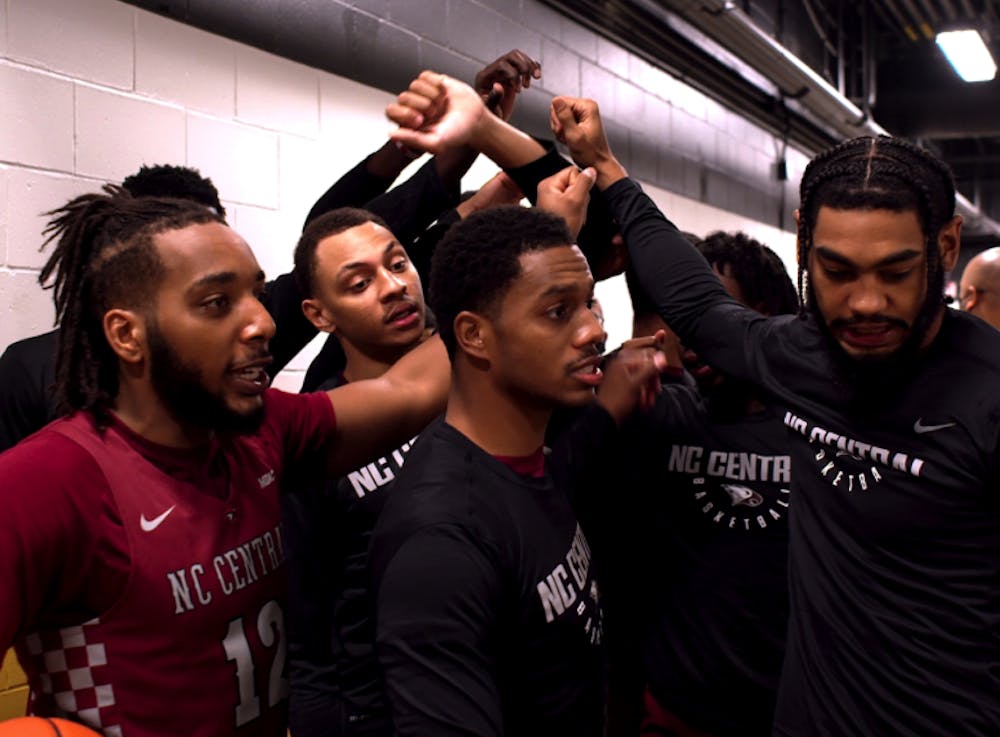The North Carolina Triangle is known as the “mecca of college basketball.” Storied athletics programs at UNC, NC State and Duke comprise thirteen total NCAA championships and sport some of the most recognizable figures in college athletics. However, there are many more successful athletics programs in the Triangle than just these three ACC powerhouses. There is more to college basketball in North Carolina and around the country than the predominately white institutions (PWIs) that are featured on TV.
Within the world of NCAA basketball, HBCUs (Historically Black Colleges and Universities) are not “supposed” to get the best recruits. They are not “supposed” to win NCAA tournament games or to reach the Sweet 16. The balance of resources, including revenue from games and merchandising, heavily favors the PWIs. Despite these challenges, HBCU programs are some of the most vibrant and important teams in the country. For head coach LeVelle Moton and the North Carolina Central University’s men’s basketball team, even greater achievements are well within reach.
Moton’s ambition is not unique. Almost everyone involved in NCAA basketball has dreams of making a deep run in the tournament or getting drafted to the NBA, but the balance of power and national recognition skew heavily towards PWIs.
According to producer Luke Williams, ESPN and The Undefeated (ESPN’s platform focused on telling stories on “the intersections of race, sports and culture”) have been looking to cover HBCU athletics in greater depth for a while. This goal was then amplified by the highly-publicized police brutality of Black Americans and the growing Black Lives Matter movement throughout 2020. So when the opportunity presented itself to create an ambitious docuseries following the NCCU men’s basketball team through the tumultuous 2020-21 season, they jumped on it. That’s when the show’s executive producers NBA All-Star Chris Paul and legendary sports persona Steven A. Smith got involved. Paul, who played college basketball at Wake Forest University, is now finishing his degree at Winston-Salem State University, an HBCU which happens to be Smith’s alma mater. Paul was familiar with Coach Moton at NCCU, so the endeavor to cover the upcoming NCCU basketball season in intimate depth was born.
“‘Why Not Us’ will spotlight the importance and uniqueness of HBCUs by chronicling the NCCU men’s basketball team and the challenges they encounter throughout a season in my home state of North Carolina,” said Paul in an ESPN / NCCU press release on the series’ mission.
In the series’ first episode, we see the team celebrating their third MEAC conference championship in a row and working towards future successes, as well as the ambitious Moton expressing how NCCU will be the first HBCU team in the NCAA Sweet 16. Moton’s passion for the game of basketball and the future success of his players jumps off the screen. He knows that if NCCU and HBCUs in general are to get the respect, resources and national attention that PWIs receive, then they have to be successful on a national stage first. They have to exceed expectations with less.
NCCU’s men’s basketball team has a long history of excellence, with John McLendon, a basketball hall-of-famer and student of James Naismith, once serving as the program’s coach when the university was still called “North Carolina College for Negroes.” McLendon invented several core concepts of the game, such as the “fast break” and the “four corners offense,” the latter of which is commonly attributed to Coach Dean Smith of UNC. In 1944, McLendon’s Eagles, who were all Black, played what is now called “The Secret Game,” defeating Duke University Medical School’s all-white team 88 to 44, at considerable risk to both parties due to the segregation laws of the time. This game was the first integrated college basketball game ever played in the American South.
So what changed? How did NCCU’s team go from being more talented than Duke’s to a team that has yet to win an NCAA D1 tournament game, even if they could not participate on the same national stage?
In the words of Moton, “[PWIs] started recruiting our athletes from our programs… and put them over there. They saw the [revenue benefits] from just guys shooting a basketball.”
As PWIs began to desegregate their teams, they recruited the best athletes, so they recruited Black men. Moton’s philosophy on PWIs recruiting Black athletes is particularly striking. In the series’ first episode, he speaks of how he “wants to get [their] athlete back” and how doing so would be ”supporting your own black businesses.”
Williams, himself a graduate of the HBCU Clark Atlanta University, wants viewers to appreciate and take note of the authenticity in the series. Despite the challenges posed by COVID-19, the showrunners were able to live with the team and capture the essence of the HBCU athlete experience. While the series may be somewhat reminiscent of “Earn Everything,” which covered the Duke men’s basketball team before the 2018-19 season, “Why Not Us” strives to be more intimate and capture the unique energy and challenges faced by the team.
“The team has been hyper-focused on making sure that the show is authentic to [the HBCU experience],” said Williams. The intimate interviews and lengths to which the showrunners went to contribute to this authenticity. Cameramen lived with the team, got COVID-19 tested alongside the team and traveled with them as they competed, all in the search that authenticity. As additional material for the program and to further celebrate Black excellence, Chris Paul interviewed several HBCU graduates, including Jerry Lorenzo, Florida A&M graduate and founder of the fashion brand “Fear of God.”
“Everything that I do, I want it to feel like when I was at homecoming at Florida A&M,” Lorenzo said to Paul on the power that HBCUs have. “I want everything I do to feel like that.”
Get The Chronicle straight to your inbox
Sign up for our weekly newsletter. Cancel at any time.

